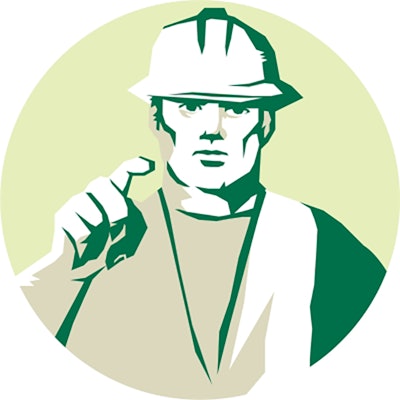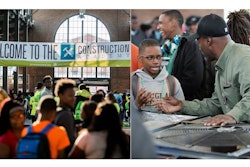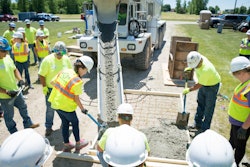
One great way to attract students to the construction industry is to hold a construction career day.
A construction career day could be very small and involve just your company. But most construction career day events include multiple contractors from the area (or even the state) and give students exposure to many of the different construction trade jobs available to them.
Construction career day events can be planned and hosted by a team usually with representatives from the construction industry, labor organizations, government, educators, schools and community organizations.
Construction career days are not like job or college fairs where exhibitors just set up a booth and attendees walk around and gather pamphlets of information. While contractors can and may still want to have that element, construction career days are meant to be a hands-on experience for attendees.
If you’re hosting or exhibiting at a construction career day consider what type of small scale or even true-to-scale construction activities you might be able to do. Maybe a small building project. Maybe the venue will let you bring some construction equipment for attendees to sit in or even operate. Maybe you use construction technology attendees can test out at the event.
Get started
So as a construction contractor looking for new ways to fill the skills gap, how can you start a construction career day in your community?
The Build Your Future (BYF) initiative started by NCCER has a whole guide offering tips on how to start a construction career day. BYF was started as a way to recruit, train, place and help the construction industry retain new workers, especially students still in high school and college.
Document: How to Plan a Career Day
What are the main elements you need to prepare when starting a construction career day? Well, first you need to put together the team. If you plan to take on the role with just your company then you have everyone you need. But most likely you’ll want to involve the local schools, community organizations and maybe even other non-competitive contractors in your area.
According to BYF, some of the key members of your planning team might include:
- School districts (directors, counselors and teachers)
- Other construction industry members
- Associations
- Industry trade councils or organizations
- Sponsors
- Vendors
- Volunteers
Having a diversified planning group can help to create the best experience possible for the students who will be attending.
In the beginning, you planning team will need to hash out some of the broader details including:
- Location
- Date of event
- Size of event
- Preliminary budget
- Sponsorship opportunities
- Exhibitor opportunities
- Giveaways
Putting a plan together
Now you have your planning team and you have the overarching details. Now it’s time to get down to the nitty gritty.
Document: Helpful Hints for Career Day Exhibitors
According to BYF, planning for a construction career day should start as far out as nine to 12 months before the event. If you’re planning to host a large event, you may want even more time to plan.
What do you need to plan for and do during those 12 months leading up to your event? BYF offers some suggestions:
12-9 months before event
- Make sure committee members, leadership team and event location/date are all selected and finalized
- Finalize the desired number of exhibitors and sponsors
- Determine insurance or liability needs
- Budget for the event
- Consider any competitions or other events you'll want to hold during the construction career day event
- Continue to hold monthly meetings
9-6 months before event
- Continue to hold monthly meetings
- Begin considering how you will get the word out and who will be the point person when talking with local or even national media
- Create informational forms and fliers for: exhibitors, sponsorships, schools, student permission forms
- Create and share save the date fliers
- Create a post event survey for attendees
6-3 months before event
- Draft a layout of what the event will look like including layout of the exhibitor hall, outside grounds and/or parking lot
- Schedule lunch (if applicable)
- Identify volunteer job descriptions and placements
- Coordinate safety and emergency plan
- Continue monthly meetings
3-1 month before event
- Confirm and secure exhibitors, sponsorships, volunteers and vendors
- Confirm number of students registered to attend
- Finalize any giveaways or goodie bags
- Rental contract
- City and/or fire permits
- Police and/or emergency coverage
- Banners/signage
- Continue monthly meetings
Week of event
- Hold a final prep meeting with the event committee
- Hold informational meeting with local sponsors, exhibitors, industry representatives and volunteers
- Confirm set-up and take down time with exhibitors and vendors
- Finalize event layout map
- Finalize any handouts
- Create staff, exhibitor, volunteer, attendee and any other needed badges
- Assign volunteers to positions and greeting stations
- Assemble giveaways or goodie bags
- Make sure any needed food or beverages are ordered
- Label safety zones where attendees are required to wear personal protective equipment
- Plan and setup a hospitality room
Day of event
- Have all staff, volunteers, vendors and exhibitors arrive at least one hour early
- Distribute badges
- Give final instructions
- Make sure attendees receive the post event survey
- Talk with participants to plan for any future events
Is it worth it?
While this may sound like a lot of work, construction career days do pay off, according to BYF. Results of surveys after recent career days show the numbers to prove it.
- 61% viewed construction careers more favorable after the event
- 80% were more interested after learning about careers in construction
- 30% would like to pursue a career in construction after attending the event
And keep in mind that construction career days don’t have to be exclusively for students. Consider casting a broader net by marketing your construction career day event to veterans, women, minorities and any other target groups in your area.




















